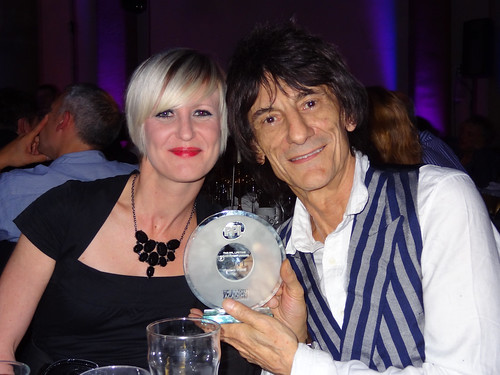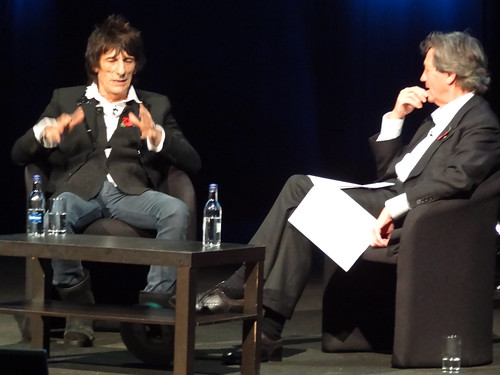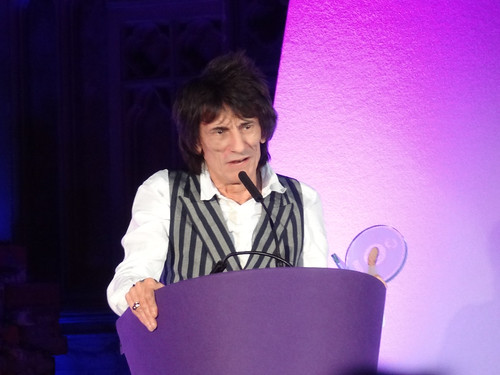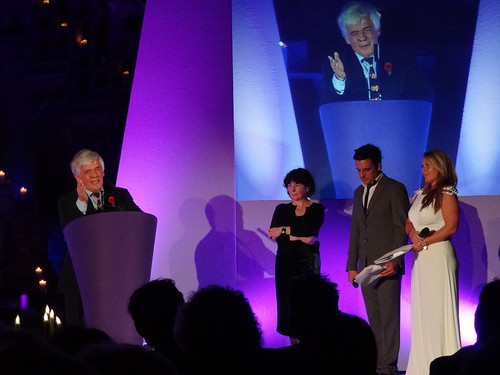
This is a continuation of my report of this year’s Radio Festival. Part one summarising TechCon can be found here while the third part summarising the second day of the main Festival can be read here.
Before I head into the main proceedings, it’s worth also mentioning Monday evening’s “opening” event – the inaugural John Peel Lecture. Presented by 6 Music and broadcast live both on 6 Music and under the red button, this was an excellent innovation that saw a full theatre watching Pete Townsend deliver his thoughts.
You can listen to the speech here (at least until the 7 Nov 2011 anyway), and read it here.
I must admit that it’s an excellent innovation, even if I was left a little disappointed by the content of Townsend’s speech. I think his heart is in the right place, and I do think I understand his underlying point even if he doesn’t make it as coherently as perhaps I’d like.
At one point he berates bloggers:
“The wolves of Blogland where it seems to me a lot of the vilest bile comes from people who could be drunk, or just nuts.”
Yet later it turns out that he discovers his own new music via blogs!
“…dozens of amazing music blogs…”
His suggestions for Apple are sensible – at least in part. And perhaps Apple should carry out his suggestion of providing support for 500 musicians. It’d generate positive PR if nothing else!
Overall, a worthy idea, and we can but hope that we get more lectures in the future.
Returning to Tuesday, John Myers, Chief Executive of the Radio Academy, and chair of this year’s committee, opened things up, before handing over to the very excellent Mark Radcliffe and Stuart Maconie who were to be our hosts in the main Quays theatre for the Festival’s duration. I can’t tell you what a truly fantastic job they did.
There’s nothing like starting with a bang, and first up was Mark Thompson, Director-General of the BBC. His full speech is availble to read here. That said, I’m not sure that Thompson was able to say a great deal that we didn’t already know.
He obviously addressed the major issues affecting the industry, and in particular BBC local radio under Delivering Quality First (DQF).
Following Tim Davie’s recent announcement that the BBC will rollout its national DAB multiplex to 97% of the population, the focus has returned to the expansion of local digital radio. Across the Festival it was referred to by all the main players, with the consensus being that a Memorandum of Understanding would be achieved by the end of the year detailing how the funding of that expansion might be achieved and paid for.
Thompson talked about creating an “audiopedia” of archive material building on the fine work that the BBC has already done with programmes like Desert Island Discs. We were told that innovation will remain “front and centre” at the BBC.
During the main part of the Festival, I was using Twitter quite a bit, and when I related that Thompson had said that the announcement of 6Music’s closure had been the cheapest and most effective marketing ever, the humour with which he said it seemed to be lost, and stirred up a little fuss amongst some. Just to be clear, he was joking (and isn’t alone in making that joke).
Then, the fine (and Nick Clarke award-winning) Steve Hewlett game Thompson a very reasonable grilling, in particular getting into the severe reductions that BBC local radio is seeing as a result of DQF.
It was noticeable that folk from BBC Merseyside are being particularly vocal in their objection to what DQF means for them. On more than one occassion we were told that Radio 4’s You and Yours employs more people than their whole station.
(As an side, during the Festival, we learnt that John Myers will be writing a report – due for delivery by Christmas – to see just how BBC local services “can maximise productivity and deliver efficiency savings across local radio” under DQF.)
And for the record, Thompson would neither confirm nor deny that Alan Hanson gets £40,000 per edition of Match of the Day!
I moved upstairs for the next session (there was a dual programme running throughout most of the Festival), to hear Gwyneth Williams, the new(ish) Controller of Radio 4 and Radio 4 Extra. I should mention that for the second year running, Margherita Taylor of Capital FM and Classic FM was the host of this room and she was fantastic. Earlier she had appeared on the main stage, and in reverse order, and with no notes at all, gave a precis of all the events that would be taking place in her room. I’m not saying that she’s not already a famous broadcaster, but bigger things await her…
Anyway, back to Radio 4. Paddy O’Connell was her mischievous interviewer (himself, of course, presenter of Radio 4’s Broadcasting House). Williams ran through the various schedule changes she’d made, and would be making. She gave mention to The Life Scientific with Prof. Jim Al-Khalili, and I can only concur that it’s a superb addition to Radio 4, and went straight on my iPod podcast list. Think of it as a science version of Desert Island Discs – without the music, but with the inclusion of friends and colleagues.
She spoke of the massive response to the cut in short stories that she experienced when talking about the feedback she’d received. And she noted that one correspondent had hoped that outgoing controller had gone to the “circle of hell” he deserved. Now – could she return the UK Theme to Radio 4 please?
Williams spoke of making Radio 4 more international. The audience was particularly excited to learn that an edition of Just A Minute was going to be recorded in India with Nicholas Parsons and Paul Merson both going. India even has Just A Minute clubs that play the game – and there’s going to be a documentary that explores them. Williams also talked about a season from Bristol and that she’d like Radio 4 to take more creative risks.
Learn more about Williams’ announcements here.
In the Q&A that followed Steve Ackerman raised the always relevant question of independent commissioning levels at Radio 4. They’re still pretty low compared with television. However Williams responded that she doesn’t simply want Radio 4 to be a publisher like Channel 4. While I think that’s a legitimate point of view, there’s surely more of a halfway house between the two positions, and we’re not close to “halfway.”
Back in the main theatre, the first of two Meet The Boss sessions saw Torin Douglas interview Global Radio’s Ashley Tabor. Trying to relate it here will make it fall flat, but Radcliffe and Maconie’s introduction to this session was side-splitting.
In his first public one-to-one interview, Tabor was very relaxed and gave an excellent account of himself. He talked about the commercial consolidation that has taken place across the sector, and said that he doesn’t think that it has completely played out yet.
He explained how he perceives Global’s way of presenting local radio which revolves around breakfast and drive. But when questioned by Douglas about his pay, he wouldn’t touch it!
He spoke about how well Global had done in spite of the withdrawal of the COI – radio’s biggest advertiser. Global had managed to replace nearly all that money – working hard to do so.
He said that he was very proud to be chair of the Radio Academy, and talked at some length about the work they’d done to pull the Radio Academy Sony Awards back in house. They’re a profitable enterprise, yet have hitherto returned very little to Radio Academy. Financially, this has been a crucial step for the Radio Academy to take.
BBC local radio cuts were obviously a conference theme, and Tabor said that he was sad to see the BBC lose any of its quality, saying that it does what it does very well. That said, he believes that it has room for manoeuvre in reducing staffing levels.
Back upstairs, I left the likes of Lisa Snowdon and Robbie Savage behind to instead to see former Bauer executive, and now CEO of EMI (at least for the time being!) Andrea Vidler talk about whether radio has the X-Factor.
While she’s clearly a fan of radio, the overall theme of her presentation was that we need to watch out because the internet is becoming more and more important to record companies. Radio and television are no longer the primary gatekeepers for developing new music. There are many alternative routes for record companies to pursue – and they’re actively doing this.
She presented a piece of research from Edison from 2010 that showed a massive fall in the importance of radio for discovery of new music. What she didn’t note was that the research was from the US, which is an entirely different kind of market. I’m certain that just about anybody in the UK launching a new artist recognises to importance of, say, Radio 1 and Radio 2.
However Vidler pointed out that when radio gets behind acts, the results can be astonishing. She highlighted Absolute Radio’s partnership with Coldplay which began with a listener competition and ended with a Sony winning behind the scenes documentary. She also referenced Global’s relationship with The Wanted, and Magic’s with Michael Bublé.
She said that record companies no longer think about releases but about careers.
Yet radio still acts as a trusted filter for listeners. Radio should think beyond the playlist. She wants joint approaches from programming and commercial teams to come up with innovative ideas. She said that plugging is less about traditional pluggers’ work and more about becoming radio promotions specialists these days.
Earlier in the year, there was a lot of talk about “day and date” – the release to iTunes and other online music stores of music at the same time as it reached radio. Vidler says that this doesn’t always work, and should be addressed on a case by case basis. There’s no generic formula.
The final session of the morning was to be a Radio Gadget Show Live! On stage, Ortis Deley and Jon Bentley would present a number of devices and pieces of software. And the audience would be able to vote for their favourites using an app called Screach.
(I did install the software on both my Android tablet and phone. Unfortunately, it crashed on my tablet – a Sony Tablet S – and cut out on my phone. I only managed to contribute one successful vote. However, others in the room did better, and managed to cast plenty of votes).
Of particular note were a software application called Luci Live that allows users to effectively broadcast, what they claim is studio quality audio just using an iPhone. It’s not the cheapest of apps at nearly £300, but with a decent 3G signal, the quality is staggering, and it surely opens up lots of potential uses.
Djay was much cheaper, and allows you to use your phone to do turntable mixing of tracks. Deley claimed that he knew somebody at a national radio station who already uses this app for 70% of his show! That caused some of the audience to start trying to work out what station that would be and who it was…
I did laugh when, at one point, Jon Bentley sang the praises of Long Wave – and in particular its reach in deepest France.
Overall, a fun session, although most of the applications and devices were represented by videos. And I’m not sure that the hosts had had the time they needed to play with them – if at all.
Torin Douglas interviewed another boss in Dee Ford, in the first session of the afternoon. As Managing Director of Bauer Radio, she talked about how Bauer approaches local compared with some of their competitors (i.e. Global). Local is expensive, she said, so you need scale to be able to achieve it.
She talked about the importance of their own internal awards – with the entire company getting to their feet when Grae Allan won a big award this year.
In terms of sales propositions, she agreed that Global had a very simple proposition, and that Bauer’s Places and Passion offerings take more to explain to the market.
She said that like the rest of commercial radio, they’re experiencing a resurgence at the moment and that commercial radio as a whole is in a really good position. Bauer had just about sold out a major event at the MEN Arena – before one of the headline acts had even been announced (it turned out to be JLS) – and that their dating service had resulted in 10 weddings so far!
Ford spoke positively about digital radio, and said that the MOU on local funding was close to being agreed. However, when addressing the BBC’s DQF proposals, she said that it was better to cut services than to salami slice.
In particular, when it looked like the BBC was going to close 6 Music, she said that they should have talked to commercial operators to see if there was a way forward. (Hang on – didn’t Absolute Radio say something similar at the time?). She said that if the BBC no longer felt able to do something properly then “I’d be interested.”
Back upstairs, we had the most rambunctious session of the Festival. And it was always going to be dangerous. Nick Ferrari’s Late Night Phone-In saw Ferrari hosting a session with Allan Beswick of BBC Radio Manchester, Jon Gaunt, Pete Price of Radio City, and James Whale of LBC.
The session took the form of a phone-in, with ex-Ofcom official Martin Campbell kicking things off on-the-line from Spain. I won’t even attempt to summarise what went on, as on many occasions there were at least three people speaking at once.
While it was good fun, I did begin to wonder whether we’d get anything out the session beyond the format of a new TV show. However, once the egos had been brought under control, we did get a few morsels.
It’s clear that there’s much less late-night phone-in programming in commercial radio than there once was, brought about in large part by consolidation. It’s less hassle, and perhaps cheaper for stations to just play music.
And commercial teams don’t really understand the programmes either according to several of the panel, which just makes them harder to exist. Whale explained that in the phone-in world, the “callers” represent the “tracks” in other parts of the industry.
There was also debate over the value of social media, with some of the older hands preferring that it didn’t exist, since it’s easier to Tweet, email or text than it is to pick up the phone.
It’d be lovely if the audio from this session was made available – although it wouldn’t be for the faint-hearted.

Downstairs again, and to one of the highlights of the Festival – Melvyn Bragg interviewing Ronnie Wood.
Bragg has met and interviewed Wood before, and his interviewing style is excellent. He really sits back and listens to his interviewees, and you get something of a conversation. We went through Wood’s history from his early years through his entry into the musical world.
Bragg: “Why did you and Rod Stewart click?”
Wood: “We had the same haircut…”
Here’s a man who always has an instrument to hand. He talked at length about his art and how important that has been to him. Indeed he says that he has studios on each of the five floors of his home – all of which have works on the go! (He has multiple exhibitions coming up).
He’s even using his iPhone for art which is then blown up and painted on again.
So relaxed was the session that you felt that if they’d left a guitar out for him, he’d have been strumming along throughout the session.
Of course he talked about the origins of his radio show, and how he’d taken to it. At first he’d thought that it’d be time consuming, but now he’s made upwards of 80 shows. And next year, Sky Arts will start to televise some of them – the preview video we saw made clear that they’re using some sumptuous production techniques.
Interestingly, he said that he and Bob Dylan are mutual fans of their shows, with Dylan getting hold of CDs of Wood’s show.
A terrific session who’s audio will hopefully surface somewhere!
Finally we had Elvis Duran being interviewed by Steve Wright, who’s a big fan. Duran had run a masterclass the previous day, and brought his entire team over to broadcast from the UK for the week. His show is syndicated across 41 stations including his home station of Z100 in New York.
If I’m honest, it wasn’t the best session of the day, with the interview being a little stilted, and not really getting the best from him. It was interactive, with members of his team contributing
Talking about zoo radio is always harder than hearing it, and something was lost in the process so that even, what I’m sure were funny prank calls, didn’t come across as funny when described.
That evening saw the PPL Hall of Fame dinner in which broadcasting greats were inducted into the Hall of Fame. As well as those pre-announced awards, a further set of awards were presented on the night.

Notably, Ronnie Wood won the Lifetime Achievement Award, Pete Waterman won the John Peel Award for Outstanding Contribution to Music Radio, and Katy Perry was named the most-played artist on UK radio.
But the big awards went to Andy Peebles, Sir Jimmy Young (who sadly wasn’t able to make it to Manchester to receive his award), Jane Garvey and Peter Allen. Garvey is now at home on Woman’s Hour, while Peter Allen is on Five Live’s Drive programme. But the pair is perhaps fondly remembered for their years together on Five Live’s Breakfast programme when they were absolutely superb together.

The best speech of the night was a close run thing. Mark Radcliffe’s introduction of Ronnie Wood was splendid despite being – how shall I put this – two sheets to the wind? But Jane Garvey’s speech was absolutely fantastic.
She also highlighted an initiative that had been launched at the Radio Festival that day – Sound Women. This is an initiative to get more women into radio – an area that they’re under-represented in. That’s a broad brushstroke – and I’d argue that at Absolute Radio we’re pretty good. But the fact is that the industry is severely lacking in female representation. Seemingly, there’s only one BBC local service fronted by a woman. That’s pretty bad (and goodness knows what it is in the commercial sector).
In fact I think that there are broader problems with the industry, and they’re class based. To get into radio these days, you effectively have to do lots of unpaid work before you can get a foot on a paid-ladder. That means that you need to be supported. Perhaps you can manage a few shifts while working a 40 hour week somewhere else, but for the most part, that means parental support or otherwise.
Broadly speaking – unless you have prosperous parents, you’re going to struggle to get a job in the sector. And of course, that also affects the racial make-up of the industry. I wouldn’t pretend that the attendees at the Radio Festival were the most racially diverse group either.
All told – there’s plenty of work to do.
Disclaimer: I attended Radio Festival because I’m employed by Absolute Radio. However, these are my views, and don’t necessarily reflect those of my employer. Not that I’ve said anything too contentious… well apart from this bit at the end
Radio Festival 2011 Report: Part Two – Festival Day One
Tags:
